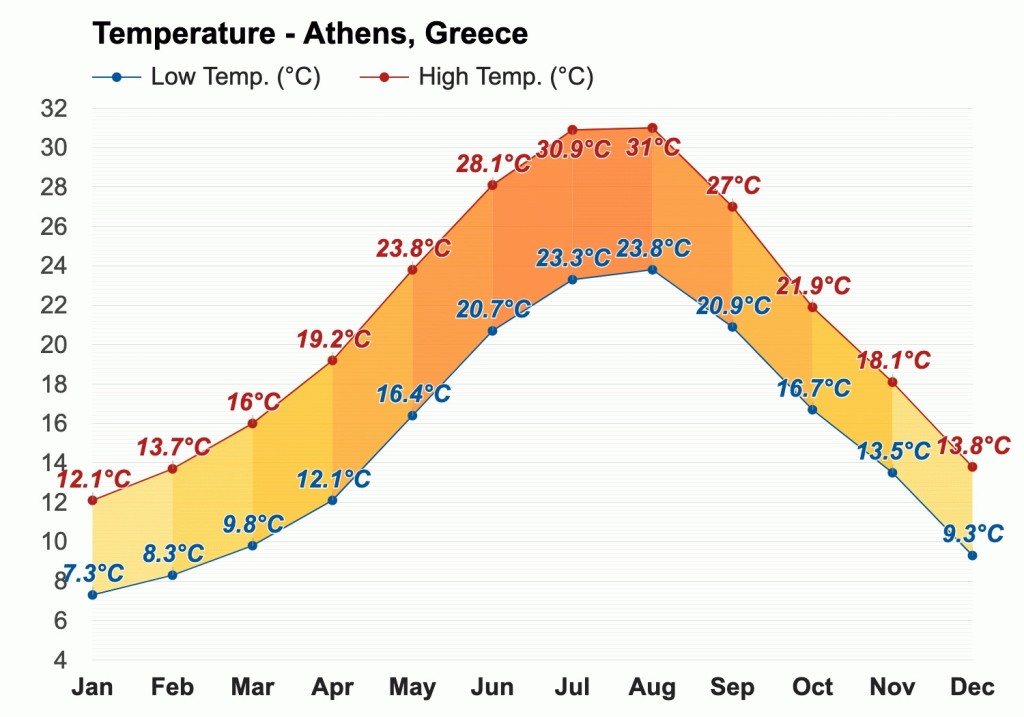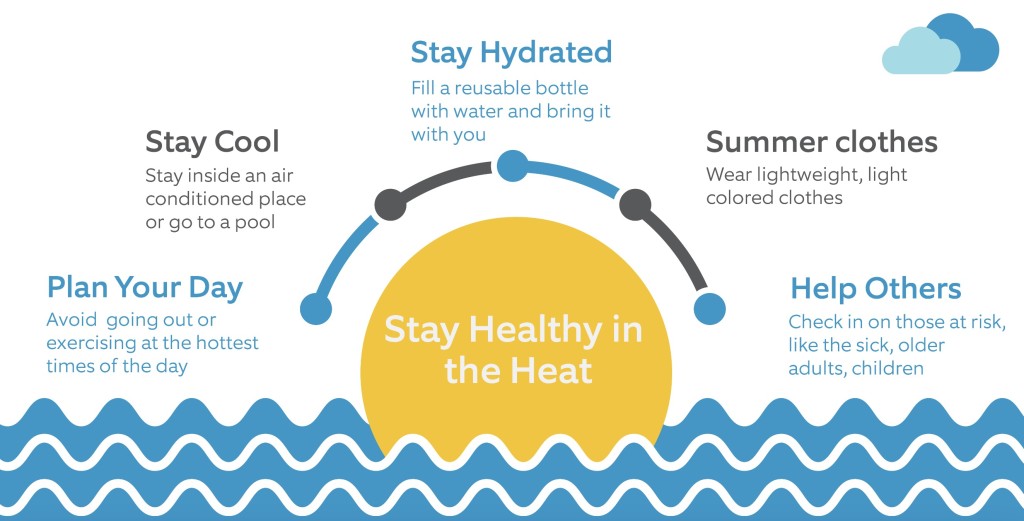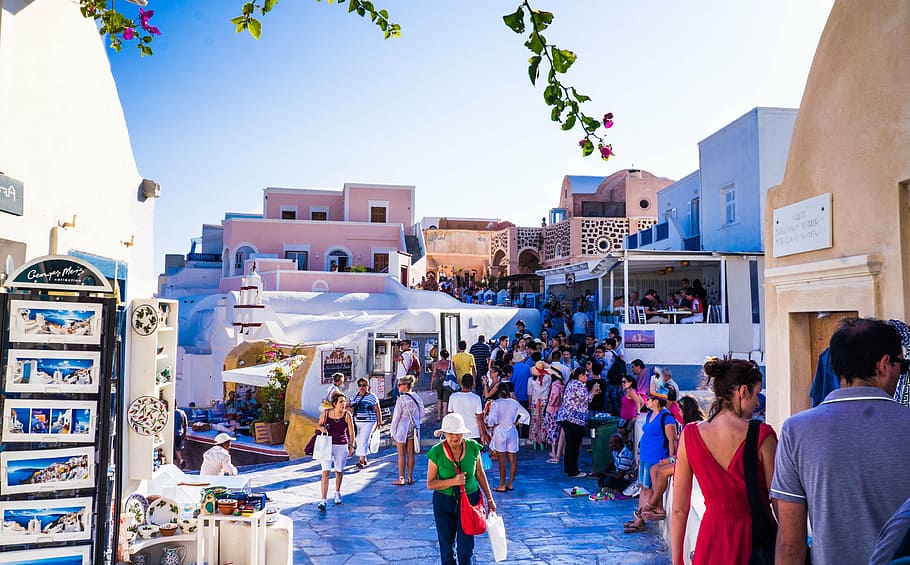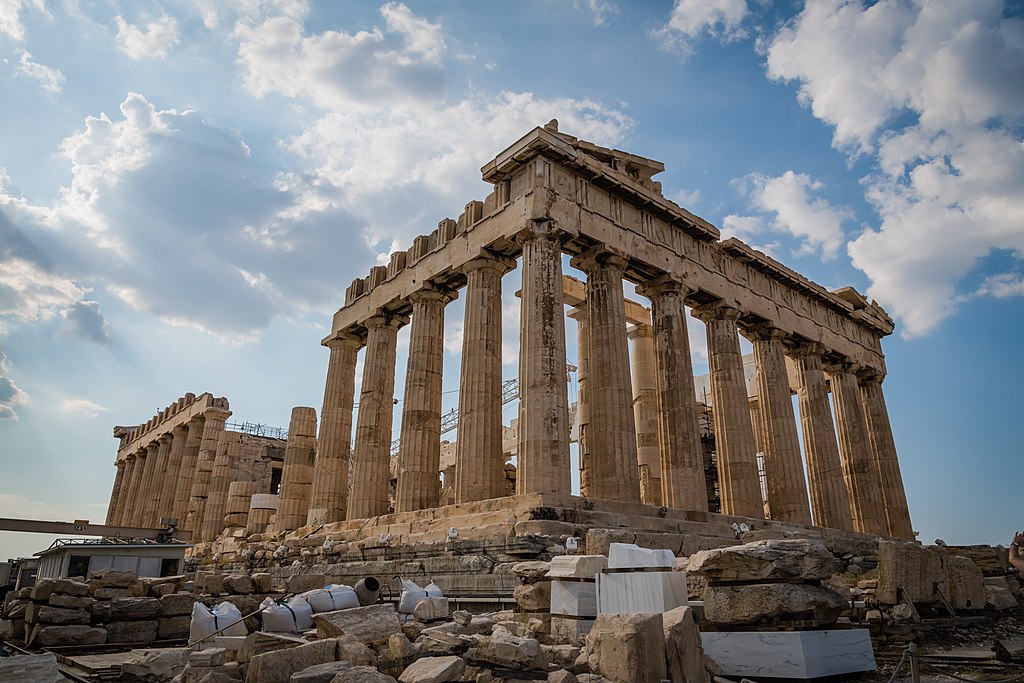
Greece is located in southeastern Europe, surrounded by the countries of Albania, North Macedonia, Bulgaria, and Turkey. Many people dream of visiting Greece one day. There is so much art, culture, and magnificent landscape to be found in this Mediterranean nation, as well as amazing historical landmarks like the Acropolis, iconic vistas in areas like Santorini, and bustling nightlife in Mykonos. However, to see Greece at its finest, you must avoid the worst times to visit Greece.
The Worst Time to Visit Greece
The worst time to visit Greece is the summer season because the weather is unbearable and there are few places to cool you. The months of July and August are the hottest as well as busiest around the nation. Be prepared for high temperatures and throngs of tourists if you want to see the sights in Athens or on the famous islands of Santorini and Mykonos. Daytime highs typically hover around 90 degrees, with occasional excursions over 100.

The humidity makes the already oppressive heat even more intolerable. If you must go there in the summer, go sightseeing early in the morning or late at night when temperatures are more bearable.
If you do not take precautions to protect your skin and drink enough water, a summer trip to Greece will end up being a nightmare. Do not go to Greece during the summer if you are not used to warm temperatures or prefer cooler climates.
Suggested Reading: Worst Time to Visit the Galápagos By Tourism Experts
Why is Summer the Worst Time to visit Greece?
Following are the important reasons why summer is the worst time to visit Greece:
- Hot weather: Given its proximity to the sea, it should come as no surprise that summers in Greece are scorching. Avoid the summer months in Greece if you cannot stand the heat by traveling there in the spring or fall.
- Chance of getting ill: There are numerous unpleasant things, such as bacteria and viruses that you may come into contact with when you are in Greece during summer. In order to be healthy and energetic throughout your summer vacation, you will stick to a healthy diet and drink lots of clean water. You do not want to waste money on medical care for heat stroke or dehydration that may have been prevented
- Crowded Beaches: During the summer months, Greece’s beaches see an influx of visitors. If you want to enjoy a quiet beach vacation, you may want to skip the summer. Mykonos and Santorini, two of Greece’s most visited islands, both experience heavy beach traffic during the peak summer season. The busiest times are in July and August when many Greeks also take vacations. Andros, Tinos, Kimolos, Sikinos, Donoussa, Ithaca, Astypalaia, and many more are among the many undiscovered, less-populated Greek islands.
- Crowded Airports and Roads: Airports in Greece become busy in the summer because of the large number of tourists that visit the country then. If you are taking a flight into Greece, getting there early might help you beat the throng. There are a lot of tourists in Greece during the summer, thus the roads might become congested. You would wish to avoid the busiest periods of the day for automobile rental if you can help it.

Precautions to Take Before Visiting Greece during Summer
Listed below are some suggestions to make your time in this beautiful nation more pleasurable and less fraught with danger:
- The prevention of third-degree burns should be your first goal, therefore be sure you use sunscreen liberally. Avoid getting a blistering sunburn by always using sunscreen.
- Keep an eye out for bugs, since many different kinds of insects call Greece home. Some of these bugs, like the malaria-carrying mosquito, may spread dangerous illnesses. If you are going somewhere where mosquitoes could be, stock up on bug repellant and wear long sleeves.
- Distribute your funds across many safe havens to keep them secure. Take some cash out each day for your excursions, and leave some in the hotel safe. Keep your cash and valuables in more than one location so that you have something to use while you make phone calls to replace the rest if they are ever stolen or lost.

Other Worst Times to Go To Greece
It is important to know that summers are not the only worst time to visit Greece. There can be numerous other occasions when Greece isn’t good for a trip.
The Easter Period
The holiday season, specifically the month of Easter (March) is also considered the worst time to visit Greece!
Easter is a significant holiday in Greece, and many locals and tourists participate in religious ceremonies and celebrations. It can get extremely crowded, especially in cities like Athens and on popular islands. Many businesses, shops, and attractions might have altered operating hours or closures during Easter week, affecting your travel plans. Due to the demand and festivities, prices for accommodations and flights may increase during Easter week.

Most Crowded Months to Visit Greece
As a coincidence, July and August are the busiest and most expensive months for travelers in Greece due to the high volume of people looking to enjoy the outdoors. There are fewer opportunities for peace and quiet at this time of year. Greece saw an increase from 4.49 million passengers in July 2019 to 5.12 million passengers in July 2022.

Finding a place to sleep is difficult and expensive, particularly in popular destinations like Mykonos, Santorini, Korfu, Kos, and Rhodes. Even at the start of September 2022, individuals who visit on the spur of the moment without making prior reservations will need a lot of luck and a fat wallet to find a place to stay on the islands.
Taking a boat from Piraeus in the high season requires an advanced ticket purchase. If you plan on taking a trip on a Friday or Sunday, when many others in Athens also take trips, you should definitely purchase your ferry tickets in advance.
Most Expensive Period to Visit Greece
The most expensive period to visit Greece is during the peak tourist season (June–August). Depending on the hotel’s location and quality, you may expect to spend anything from €30 to €100+ each night.
If you are on a trip with a large party, it can be cheaper to stay in a vacation rental like Airbnb. Meals at modest restaurants often cost between €10 and €20 per person, while those at fancier establishments might cost €30 or more.
If you are on a tight budget, consider eating at local restaurants or shopping at local markets. From Athens, you can take a boat to Santorini for €40, while a trip to Crete would set you back roughly €50.
Related Reading: Worst Time to Visit Las Vegas According to Travel Experts
What is the Worst Time to Visit Greece: According to Other Tourists?
Hopdes team visited Greece during the summers too. Here’s what they had to say
Zalah Khan said, “I spent ten days in Greece in July, last year. Trains, taxis, buses, and air traffic controllers have all gone on strike in that little period. Unions representing government employees are producing a great deal of unrest, so a trip there may be better postponed for some time”.
Umar Ali, our Editor-in-Chief, said, ”Going to Greece in the summer season could seem like you’re punishing yourself, to be quite honest. I spent the end of July and the beginning of August in Greece. The heat was intense. The weather in Athens hit a high of 36 degrees Celsius when my wife and I were out enjoying the city.”
Month-by-Month Analysis: Worst Month to Visit Greece
Following our month-by-month analysis, you can pick the most suitable month for visiting Greece.

January
- Temperatures: Average temperature ranges from 8°C (46°F) to 14°C (57°F).
- Weather: It is the coldest month in Greece, with occasional rainfall and some snowfall in mountainous regions.
- Activities: This month is ideal for exploring historical sites and museums in Athens, enjoying winter sports in mountainous areas like Mount Parnassus or Mount Olympus, and experiencing the local culture and traditions.
- Special Events: New Year’s Day celebrations take place across the country, with fireworks and festivities in major cities.
- Crowd Level: January is considered the off-peak season, so tourist crowds are generally low, except in popular winter destinations.
February
- Temperatures: Average temperature ranges from 9°C (48°F) to 15°C (59°F).
- Weather: Similar to January, February experiences cooler temperatures with occasional rain and snow in the mountains.
- Activities: Exploring ancient ruins, visiting archaeological sites, and enjoying winter sports continue to be popular activities.
- Special Events: Carnival celebrations take place in various cities, with colorful parades, masquerade parties, and traditional customs.
- Crowd Level: February still sees relatively low tourist crowds, except in areas where Carnival celebrations are held.
March
- Temperatures: Average temperature ranges from 11°C (52°F) to 17°C (63°F).
- Weather: March marks the beginning of spring in Greece. The weather starts to warm up, but occasional rain showers are still possible.
- Activities: Sightseeing, hiking, and exploring the natural beauty of Greece are popular during this time. Some beaches may also be suitable for sunbathing.
- Special Events: The Greek Independence Day is celebrated on March 25th with parades, fireworks, and festivities throughout the country.
- Crowd Level: The tourist crowds are generally low to moderate in March, except during the Greek Independence Day celebrations.
April
- Temperatures: Average temperature ranges from 13°C (55°F) to 19°C (66°F).
- Weather: April brings pleasant weather with mild temperatures and increasing sunshine. Rainfall decreases as the month progresses.
- Activities: This is an excellent time for outdoor activities, such as visiting ancient sites, exploring islands, and enjoying beach time.
- Special Events: Greek Easter, which is one of the most significant holidays, usually falls in April. It is celebrated with religious ceremonies and festive traditions.
- Crowd Level: April sees a moderate increase in tourist crowds compared to the previous months, especially during Easter week.
May
- Temperatures: Average temperature ranges from 17°C (63°F) to 23°C (73°F).
- Weather: May offers warm and sunny days, with minimal rainfall. The sea temperature starts to become more comfortable for swimming.
- Activities: Exploring archaeological sites, island hopping, and enjoying outdoor activities like hiking or water sports are popular choices.
- Special Events: May Day, an international labor holiday, is celebrated with various events and festivals across the country.
- Crowd Level: May sees a gradual increase in tourist crowds, but it is still considered a relatively calm month compared to the peak summer season.
Editor’s Pick: Ultimate Guide to The Worst Time to Visit Jamaica
June
- Temperatures: Average temperature ranges from 21°C (70°F) to 28°C (82°F).
- Weather: June brings warm and sunny weather, making it an ideal time for beach activities and water sports. Rainfall is minimal.
- Activities: Exploring islands, relaxing on the beaches, and indulging in water activities like snorkeling and diving are popular during this month.
- Special Events: The Athens Epidaurus Festival starts in June, featuring a variety of cultural performances, including theater, music, and dance.
- Crowd Level: June marks the beginning of the peak tourist season, and popular destinations can get quite crowded, especially during weekends.
July
- Temperatures: Average temperature ranges from 24°C (75°F) to 31°C (88°F).
- Weather: July is hot and sunny, with little to no rainfall. It is the height of summer in Greece.
- Activities: Enjoying the beaches, exploring historic sites, and indulging in water sports are the top activities during this month.
- Special Events: The International Athens and Epidaurus Festival continues with a diverse program of cultural events.
- Crowd Level: July is a high tourist season, and popular destinations, particularly the islands and coastal areas, can be crowded. It’s advisable to book accommodations and attractions in advance.
August
- Temperatures: Average temperature ranges from 24°C (75°F) to 31°C (88°F).
- Weather: August experiences hot and sunny weather, similar to July, with minimal rainfall.
- Activities: Beach activities, island hopping, and enjoying the vibrant nightlife are popular choices during this month.
- Special Events: The Assumption of the Virgin Mary (Panagia) is celebrated on August 15th, with religious processions and festivities.
- Crowd Level: August is the peak of the tourist season in Greece, and it can get extremely crowded, especially in popular tourist destinations. It’s important to expect higher prices and make reservations well in advance.
Our Pick: Worst Time to Visit Rome, Italy
September
- Temperatures: Average temperature ranges from 20°C (68°F) to 27°C (81°F).
- Weather: September offers warm and pleasant weather, with slightly cooler temperatures compared to August. There might be occasional rainfall.
- Activities: Exploring archaeological sites, visiting cultural attractions, and enjoying the beaches with fewer crowds are popular activities.
- Special Events: The Thessaloniki International Fair (TIF), one of the largest trade fairs in Southeast Europe, takes place in September.
- Crowd Level: September sees a decrease in tourist crowds compared to August, but it is still a popular month for visitors. It’s generally less crowded and more affordable than the peak season.
October
- Temperatures: Average temperature ranges from 16°C (61°F) to 23°C (73°F).
- Weather: October brings mild temperatures and occasional rainfall, especially towards the end of the month. It marks the transition to autumn.
- Activities: Exploring historical sites, hiking, and enjoying the beautiful autumn landscapes are popular during this month.
- Special Events: The Athens Marathon, a significant sporting event, usually takes place in late October, attracting participants from around the world.
- Crowd Level: October sees a decrease in tourist crowds compared to the summer months. It can still be moderately busy, particularly during the Athens Marathon.
November
- Temperatures: Average temperature ranges from 12°C (54°F) to 18°C (64°F).
- Weather: November brings cooler temperatures and increased rainfall. It is considered the transition month from autumn to winter.
- Activities: Exploring historical sites, visiting museums, and enjoying the vibrant city life in Athens are popular choices during this time.
- Special Events: The Athens Marathon, held in early November, continues to be a major event for runners and spectators.
- Crowd Level: November is considered an off-peak month with lower tourist crowds. The popular tourist destinations are generally less crowded, providing a more tranquil experience.
December
- Temperatures: Average temperature ranges from 9°C (48°F) to 15°C (59°F).
- Weather: December is characterized by cool temperatures, occasional rain, and shorter daylight hours. It is the beginning of winter in Greece.
- Activities: Exploring historical and cultural attractions, visiting Christmas markets, and enjoying festive decorations are popular during this month.
- Special Events: Christmas and New Year’s Eve are celebrated with festivities, lighting ceremonies, and traditional customs across the country.
- Crowd Level: December experiences lower tourist crowds compared to the summer months. While popular cities like Athens and Thessaloniki may have a festive atmosphere, overall, it is a quieter time for tourism in Greece.
Conclusion
In conclusion, the worst time to visit Greece is during the summer months, particularly July and August. The scorching heat, high humidity, and influx of tourists make it a challenging time to enjoy the country’s attractions comfortably. If you still decide to visit Greece during the summer, taking precautions to protect yourself from the heat, such as staying hydrated and seeking shade during the hottest hours of the day is important.
Worst Time to Visit Greece - FAQs
The months of July and August are the absolute worst times to visit Greece because of hot weather and high prices.
During the winter months (December to February), some beach destinations may have limited outdoor activities, reduced operating hours, or even closures of tourist attractions.
During winters in Greece, the average temperatures range from 8°C (46°F) to 15°C (59°F). The country experiences relatively mild winters compared to many other European destinations.






